The cow in Indian culture is portrayed as a sacred being. Indians do not eat beef and are very strict with actions that offend cows. In fact, more than half of the states have regulations banning the slaughter and eating of beef.
The cow in Indian culture is portrayed as a sacred being, worshiped as a god. People here never eat beef, on the contrary, they build centers to care for and protect cows. For Hindus, they believe that feeding cows is a way to please the gods and make wishes come true. They often hold the cow’s tail and let it touch its head to pray for the gods’ blessing.
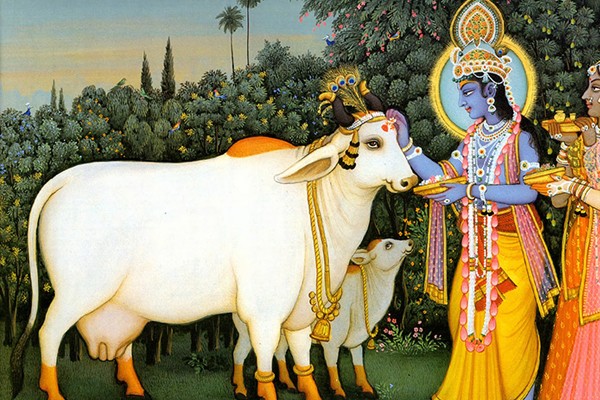
Where does the cow’s divinity come from?
Indians revere and worship the cow, raising the image of the cow to the position of Cow God. People worship the white bull Nandi as the mount of Shiva, the god of destruction, one of the three supreme gods of Hinduism. Shiva’s bull symbolizes justice and strength, is the “Mother of the past and the future”, providing milk to nourish humans and help cure diseases.
The Dodda Basavana Gudi temple in India is considered the largest temple worshiping the cow god Nandi in the world. The white color of the Nandi bull symbolizes purity and justice. Women often go to the temple to offer flowers to the cow god and touch the stone statue of the cow god to pray for children. They believe that if they are sincere to the cow god, all their requests will come true.
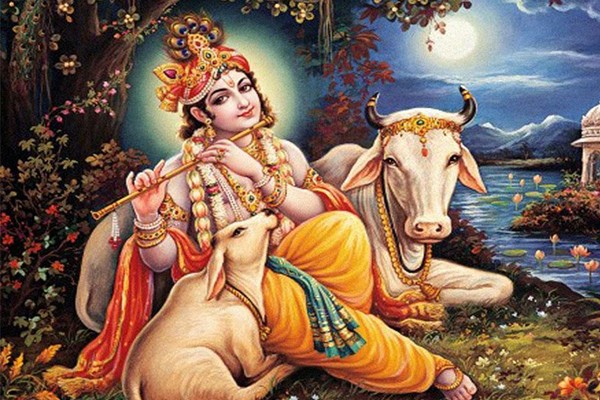
The bull god Nandi is the mount of Shiva, one of the three supreme gods of Hinduism
In the Vedas, cows symbolize abundance and fertility because cows are the source of Heaven and Earth. In the scriptures, there are many words praising and respecting the cow, in addition to regulations prohibiting cow slaughter. We can mention an excerpt describing the sacredness of the cow in Indian culture in general and in the Vedas in particular:
“The Holy Spirit, the Cosmic Passion,
Yes, the Cow gives life to the Gods,
The Cow transmits life to humans.”
To what extent is the cow revered in Indian culture?
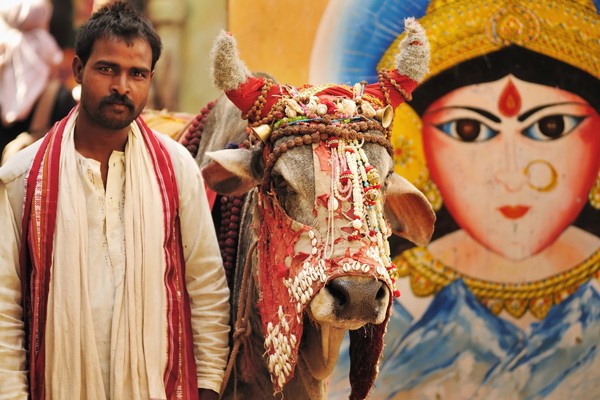
The cow in Indian culture is so revered that no one dares to eat beef
For many other countries, they consider beef the number one food, but in India no one dares to eat beef. They only dare to use cow’s milk or the cow god Nandi’s waste, cow urine and cow dung, to treat diseases. Indians also use cow dung to clean houses, replace fertilizer in agricultural activities and as daily fuel. They also believe that cow urine can cure diseases, whether they are common diseases or cancer.
In India, cows can roam freely on the road. If anyone kills a cow, they will be punished with imprisonment for murder. There are laws that prohibit people from owning, buying, selling or transporting beef. Violators can be imprisoned and fined.
The cow in Indian culture is so revered that you can find cow god temples on every street or corner here. Whenever facing difficulties, Indians often go to the cow god temple to worship and pray to the gods. Besides, they believe that feeding cows is a way to please the gods and make their wishes come true. They often hold the cow’s tail and let it touch its head to pray for the gods’ blessing.
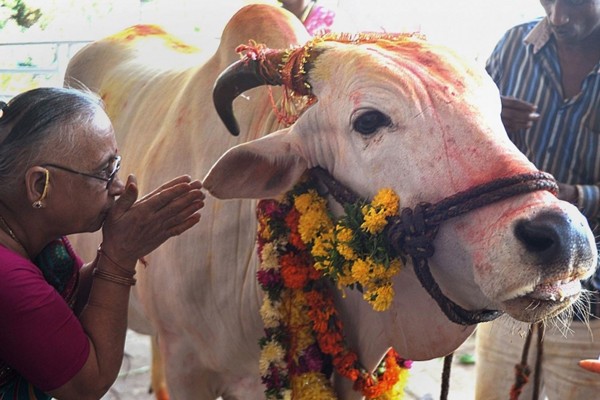
Indians often go to the cow god temple to worship and make wishes
Not only that, to avoid “blaspheming” the cow god, Indians also built centers to care for and protect cows. Wandering cows can be brought to the center for care. Besides, the image of a cow is used in feng shui to increase family luck. During funerals, the cow appears as a god guiding the dying person to heaven.
Why are cows considered sacred, and not some other animals?
For Hindus, the cow is considered a particularly docile and generous creature, giving people more than they receive from them including milk, cheese, butter (also known as ghee), urine and feces. Milk, cheese, butter were used to worship the gods and as food, urine and feces for penance or as fuel for burning.
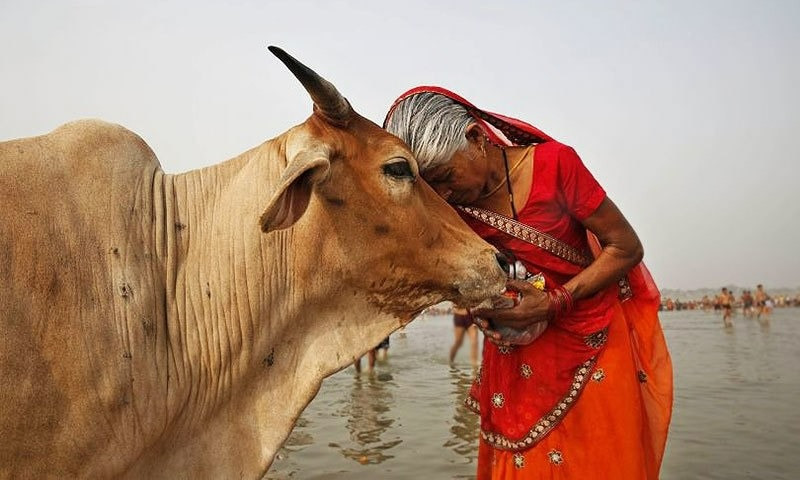
Trên thực tế, ngoài bò thì một số động vật khác cũng được người theo đạo Hindu để đại diện cho các vị thần mà họ thờ phụng như voi (thần Ganesh), chuột (thần Ganesh), khỉ (thần Hanuman), hổ (thần Durga)… Nhưng bò vẫn là con vật được tôn kính nhất.
Đạo luật bảo vệ bò tại Ấn Độ
Với văn hóa tại Ấn Độ, hậu quả sẽ cực kì nghiêm trọng nếu ai đó xúc phạm đến thần bò. Thậm chí, có hơn một nửa các tiểu bang đưa ra quy định cấm giết mổ và ăn thịt bò. Năm 1995, đạo luật Rajasthan Bovine Animal Act ra đời, nghiêm cấm người dân sở hữu, mua bán hoặc vận chuyển thịt bò. Từ đó, thịt bò trở thành hàng “quốc cấm”, những ai vi có thể bị phạt tù 2 năm và nộp phạt số tiền đến 10.000 rupee (khoảng 150 USD).
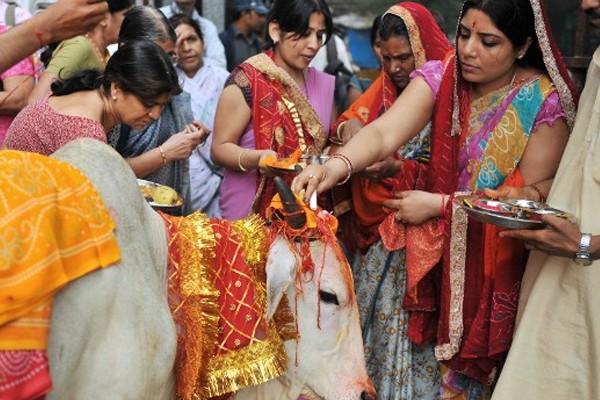
No one in India dares to insult the cow god
According to the animal protection law of the state of Gujarat, those who transport cows will be convicted and sentenced to 10 years in prison. And the fine for violators can be up to 100,000 rupees (about 35 million VND). The state of Gujarat is considered one of the places with harsh penalties in India.
If you set foot in this country, you should learn about the culture, especially the image of cows in Indian culture. From there, you can figure out what individuals need to prepare and what items to avoid bringing to travel safely here.
Note when traveling to India
To avoid unfortunate incidents when traveling to India, please take note of the following experiences:
– Absolutely do not bring any cow products into India. Especially dried beef, clothes, bags and shoes made from cowhide.
– Do not eat beef in India.
– When you see cows walking on the road, stay away and do not chase or beat them.
– You should bring pork products to eat.
